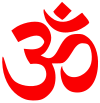- Hindu reform movements
-
Practices
Several contemporary groups, collectively termed Hindu reform movements, strive to introduce regeneration and reform to Hinduism. Although these movements are very individual in their exact philosophies they generally stress the spiritual, secular and logical and scientific aspects of the Vedic traditions, creating a form that is egalitarian that does not discriminate based on Jāti (caste or subcaste), gender, or race. Thus, most modern Hindu reform movements advocate a return to supposed ancient, egalitarian forms of Hinduism, and view aspects of modern Hinduism, such as discrimination and the caste system, as being corrupt results from colonialism and foreign influence.[1]
Contents
Introduction
Active Hindu communities are to be found in all parts of the world. In particular, countries of the former Soviet Union and Poland have thriving Hindu communities due to the missionary work of the Hare Krishnas. Most of the Hindu movements, with the exception of the Hare Krishna movement, reflect a more Smarta-like ideology.
There are groups in India that are actively engaged in getting women and those from socially disadvantaged jātis to become priests of Vedic ritual.
One of the foremost movements in breaking the caste system and educating the downtrodden was the Lingayat movement spearheaded by Basavanna in the 12th century in Anubhava Mantapa in Kalyani of Karnataka. The less accessible Vedas were rejected and parallel Vachanas were compiled.
The new movements look up to Swami Vivekananda; Rabindranath Tagore; Ramana Maharshi; Shri Aurobindo (for his Integral Yoga); A.C. Bhaktivedanta Swami Prabhupada (founder of the modern Hare Krishna movement); Swami Sivananda, Swami Rama Tirtha; Narayana Guru,Jagadguru Swami Sathyananda Saraswathi, Paramhansa Yogananda; Shrii Shrii Anandamurti. More recently, the work of Maharishi Mahesh Yogi, Sathya Sai Baba, Shirdi Sai Baba, Swami Muktananda, Swami Chinmayananda, Maharishi Dayananda Saraswati, Shriram Sharma Acharya,Pramukh Swami Maharaj, Sri Sri Ravi Shankar, and Mata Amritanandamayi has inspired millions to create new centers of spiritual development. In the intellectual field, the writings of Ananda Coomaraswamy, Ram Swarup, Sita Ram Goel, Subhash Kak, Frank Morales and David Frawley have been influential.
In social work, Mahatma Gandhi, Vinoba Bhave, Baba Amte and Shrii Shrii Anandamurti have been most important. Sunderlal Bahuguna created the chipko movement for the preservation of forestlands according to the Hindu ecological ideas.
The Rashtriya Swayamsevak Sangh or RSS was founded by Keshav Baliram Hegdewar in 1925. The goal was to unite Hindus, make them rise over their caste differences and work to achieve a Hindu Rashtra; the ideology of the Sangh, closely associated with political Hinduism, came to be known as Hindutva.
In Indonesia several movements favour a return to Hinduism in Java, Sumatra, Kalimantan, and Sulawesi. Balinese Hinduism, known as Agama Hindu Dharma, has witnessed great resurgence in recent years. Shrii Prabhat Rainjan Sarkar (founder of Ananda Marga) initiated a new renaissance in the Indian world of samgeet.
See also
- Ayyavazhi
- Bengal Renaissance
- Contemporary Sant Mat movements
- List of Hindu organisations
- Hinduism in the West
- Organisations
- Arya Samaj
- BAPS
- All World Gayatri Pariwar
- Tilak Mission
- Bhagwan Swaminarayan
- ISKCON
- Parisada Hindu Dharma
- Prarthana Samaj
- Ramakrishna Mission
- Sathya Sai Organization
- School of Economic Science
- Sree Narayana Dharma Paripalana
- Swadhyay Movement
- Swaminarayan Sampraday
- Transcendental Meditation movement
- Notable personalities
- Acharya Gour Ganguly
- Shriram Sharma Acharya
- Saint Thyagaraja
- Paruthiyur Krishna Sastri
Notes
- ^ "The Reform Movements". http://hinduism.iskcon.com/tradition/1207.htm. Retrieved 2008-11-16.
References
- John Nicol Farquhar, Modern Religious Movements in India, Kessinger Publishing (2003), ISBN 0766142132.
- Kenneth W. Jones, Socio-Religious Reform Movements in British India, The New Cambridge History of India, Cambridge University Press (1990), ISBN 0521249864.
- J. Zavos, Defending Hindu Tradition: Sanatana Dharma as a Symbol of Orthodoxy in Colonial India, Religion (Academic Press), Volume 31, Number 2, April 2001, pp. 109–123.
- Ghanshyam Shah, Social Movements in India: A Review of the Literature, New Delhi, Sage India, 2nd ed. (2004) ISBN 0761998330
External links
Hindu reform movements Topics Reformers Sri Aurobindo · Sita Ram Goel · M.S. Golwalkar · Mahatma Gandhi · Harsh Narain · The Mother · Prabhupada · Raja Ram Mohun Roy · Pandurang Shastri Athavale · Ramakrishna · Dayananda Saraswati · Satsvarupa dasa Goswami · V.D. Savarkar · Swami Sivananda · Arun Shourie · Ram Swarup · B.G. Tilak · Swami Vivekananda · Yogananda · Swami Vipulananda · Arumuga Navalar · moreCategories:- Hindu movements and organizations
Wikimedia Foundation. 2010.


